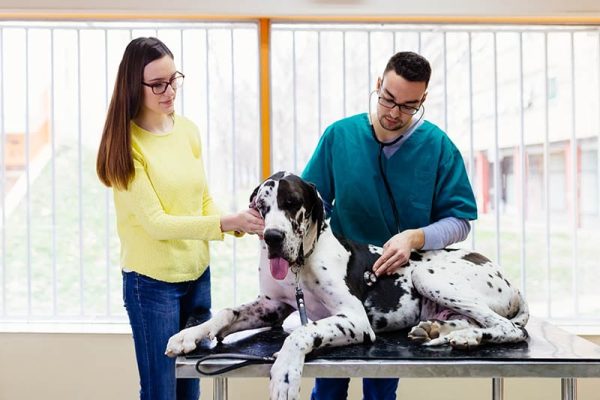People who have allergies usually present watery eyes and runny noses, sneezing, and scratching. Similarly, dogs can be allergic to pollen and food, as well as to the hair of other animals.
Although it’s not common, dogs can also be allergic to humans. Humans leave dander behind, like other animals, and dogs can be allergic to it.
Usually, these dogs are diagnosed with generalized atopic dermatitis, which is a long-term condition with a tendency to recur periodically. Its clinical signs include excessive itching and scratching, watery eyes and runny nose, and hair loss.

What Makes Dogs Allergic to Humans?
Allergy is an exaggerated reaction of a dog’s immune system, which is triggered when they come into contact with an allergen (a foreign substance that triggers the response). When a dog is allergic to humans, their immune system reacts when it comes into contact with human dander (skin flakes). This allergen reaches the dog’s body through inhalation 1 or ingestion. Direct contact with the allergen can also trigger an immune response.
Although they seem relatively harmless, skin allergies pose a risk of further infection. If the allergy is left untreated, it can lead to skin complications because as your dog scratches, bites, or licks frequently, their skin becomes increasingly irritated and sensitive, being more prone to infection with various bacteria.

What Are the Signs That Your Dog Is Allergic to You?
Since a dog’s allergy to humans is similar in terms of clinical signs as other allergies, it will not be easy to figure out if your pet is allergic to you or something else. In general, dog allergies manifest through the following clinical signs:
- Sneezing
- Watery eyes
- Runny nose
- Itching
- Hair loss
- Ear infection
- Excessive scratching, especially around the eyes, ears, paws, and anus
- Respiratory and gastrointestinal signs (less often)
Most dogs will have a mild to severe itching sensation all over their body, and they may chew their paws until they become red and irritated. The paws have sweat glands, and they can become inflamed as part of an allergic reaction.
When secondary skin infections develop, the following clinical signs may appear:
- Moist skin
- Crusts
- Unpleasant skin odor
If your dog’s allergic reaction does not occur when the season changes or after eating certain foods, you can suspect that they are allergic to humans (or other pets). Also, your dog might be allergic to humans if they spend time away from people or come into minimal contact with them and their clinical signs improve but then reoccur after a short while after human contact again.
If you are concerned about the health and well-being of your pet, seek veterinary advice for the best course of action.
Did you know you can speak to a veterinarian without having to travel? Just head over to PangoVet. It's our online service where you can talk to a vet online and get the advice you need for your pet — all at an affordable price!

How Is a Dog Allergy to Humans Diagnosed?
Faced with a dog whose only clinical sign is scratching excessively, it is extremely easy for a vet to misdiagnose the problem. Sometimes, they may administer various drugs, hoping that at least one medicine will be effective and lead to the disappearance of clinical signs. But this is not the ideal thing to do.
- Allergy testing, either intradermal or through blood tests
- Individual elimination of potential allergens from your dog’s living environment until the culprit is found
Intradermal testing 2 in dogs is similar to that in humans. Your dog will be lightly sedated so the veterinarian can perform the test. Various allergens will be injected into your dog’s skin in separate points, to see if there is a reaction. Areas, where the skin becomes red and inflamed, indicate the allergens that are responsible for your dog’s clinical signs.
How Common Is It for Dogs to Be Allergic to Humans?
Dog allergies to humans are not that common, though some veterinarians may argue otherwise. Since human allergies are difficult to diagnose in dogs if intradermal or blood tests are not performed, veterinarians cannot say with certainty the cause of your pet’s allergy unless they develop specific clinical signs.
Human allergies can be easily confused with chronic allergies or other types of allergies because the clinical signs are similar.

What to Do If Your Dog Is Allergic to Humans
What you can do for your allergic dog is to improve the environment in which they live and talk to a veterinarian about the most suitable treatment.
- Clean and vacuum your house daily. This way, the dander from everyone won’t float in the air and get deposited everywhere.
- Get rid of items that cannot be washed, such as carpets or upholstery.
- Choose upholstery made of natural leather or materials that can withstand repeated washing.
- Wash your body and hair often (this goes for other family members too). In this way, you will reduce the amount of dander that can fall from your body and float around.
- Do not let your dog sleep in your bed unless it is necessary. In that case, change the bedding often, and at the very least, do not let your dog sleep next to you under the blanket.
- Buy an air purifier.
- Open the windows daily to let the fresh air in and increase cross ventilation.
To help your dog directly, give them regular baths with hypoallergenic dog-safe shampoos to get rid of itching and redness, and supplement their food with fish oil, which is rich in omega-3 and omega-6 fatty acids (to help reduce inflammation).

Conclusion
Dogs can be allergic to humans—specifically, to human dander. Since this condition is difficult to diagnose without specific tests, it is not possible to say for certain how common or rare this type of allergy is in dogs.
The clinical signs of an allergy to humans are similar to those of common allergies and include itchy skin and excessive scratching, watery eyes and runny nose, and hair loss. In rare and severe cases, difficulty breathing can also occur. If your dog starts showing these clinical signs and they do not go away with the change of season or food, your pet may be allergic to you and other family members.
See also: Can Cats Be Allergic to Dogs? Vet Explained Info & How to Help
Featured Image Credit: Viorel Sima, Shutterstock




















